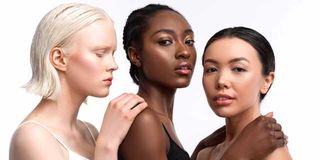Beware of the effects of light skin vs dark skin debate on young people

Varying human skin colour. A friend says she was always moved to the back of the line in wedding processions because of her colour.
What you need to know:
- Parents, teachers, guardians, uncles and aunts, when raising children, do not pit their children against other children whose skin colour is lighter or darker.
- I have been to a salon where this well-meaning lady told me that my skin colour (I am dark-skinned) already says I was successful in academic work.
I have to begin with a confession: Lately, I spend an obscene amount of my free time on TikTok.
I have curated my page in such a way that for every 30 minutes I spend on TikTok, I get a good balance of intellectual, spiritual, comic and newsy content.
On good days, I discover new content creators on my #FYP (For You Page), including trending topics like the latest Kenya vs Uganda online war that went south very fast.
Also read: The colour divide
On particularly bad days, I have to unfollow content creators who post content that I find at odds with my values and beliefs. Guys, I take my freedom of choice very seriously. But such is life, a continuous process of discovering, learning and iteration, no?
Anyway, I saw a trending video by students of a certain university in Kenya. In the video, a guy randomly asks guys around what seems to be the school premises or its environs, who the hottest girl is in the university.
The names of two girls kept coming up. The guys variously said the girls were hot because they had big bums and big boobs (mali safi) and other stuff like that.
Well…I cringed a bit but rationalised these videos in my head as young men and women at the throes of adulthood, forming their sexual identities.
I also told myself that the videos were probably staged just to hype the school as a fun place to study, and I didn’t need to wonder what students are learning in university these days, lol!
I had completely moved on with my life until I chanced upon another video, a continuation of ‘who is the hottest girl on campus’. This time, the guy had met one of the ‘hot girls’ and was getting her reaction to what the guys in her school considered ‘hot’.
Also read: ONGAJI: We need to talk about colourism
Below are excerpts from the 40-second video.
“If you think you are prettier than me, hotter than me, let's do a challenge…”
Well, until that point I was like, yes! The younger Gen Z girls are not playing small for anybody, they are bold and own their uniqueness.
But it is what she said next that got me a bit concerned…that even as the younger generations are determined to be the face of inclusion, we still carry baggage whose primary instinct is to exclude rather than include others on the basis of invalid things such as one’s skin colour.
Also read: One woman’s fight against skin colour stigma
“…those black women, dark-skinned women, tafadhali don’t even try, msijisumbue. Hakuna chance yako hapa.”
My jaw almost dropped. Okay, if you have not been able to connect, basically, this ‘hot girl’ was saying that she is willing to contest with anyone who thinks they are prettier than her, but also said if you are dark-skinned, do not bother contesting because you cannot be prettier than her.
Now, I absolutely have no intention of having a fight with a girl in her early 20s over comments she made on social media; comments I know that she will not be very proud of when she looks back in five or 10 years.
Also read: All women should be equal in the eyes of men
Hopefully, the consequences will not be as bad as it happened to Idris Muktar Ibrahim who lost his job because of a 10-year-old tweet (which he posted as a teenager).
The point I am making here is that this girl is a product of deep-seated societal prejudices that have always existed when it comes to race and colourism.
And while most people in the world have made significant progress in understanding that discrimination based on colour or race is foolhardy, there is still some ground to cover.
I have a friend who tells me that as a kid, she was always moved to the back of the line in wedding processions and her lighter-skinned friends put at the front.
By the time we were having this conversation in 2020, this issue had so much festered and affected her self-esteem, she struggled to believe she was beautiful.
And that is why my call to action is to parents. Do not be the source of prejudice for your children. While the ‘hot-girl’ comment may have been harmless to an older audience such as me, it has the potential to cause self-esteem issues for ungrounded younger girls, like it happened to my friend.
Parents, teachers, guardians, uncles and aunts, when raising children, do not pit them against other children whose skin colour is lighter or darker.
I have been to a salon where this well-meaning lady told me that my skin colour (I am dark-skinned) already says I was successful in academic work.
She said she didn’t even need to ask if I had a degree.
Then she went on, completely unprovoked, to tell me that people with her skin colour do not do well in school (she is light-skinned).
I can only imagine how a little light-skinned girl listening to our conversation would have interpreted these words.
Let’s think before we speak, okay?
The writer is the Research and Impact Editor, NMG ([email protected]).





